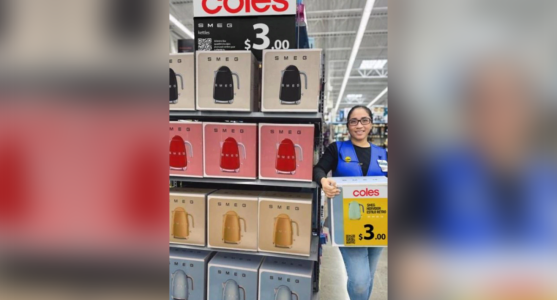Aussies demand social media take action against scam ads to protect users
By
- Replies 26
In the digital age, the convenience of online shopping and social media has become a staple in our daily lives, especially for those who appreciate the ease of connecting with friends and family and purchasing items from the comfort of their homes.
However, this convenience has a dark side—the ever-present threat of online scams.
Despite the efforts of individuals and consumer advocacy groups, even digital world giants like Facebook seem to fail to protect their users from fraudulent activities.
Lindsay, from Melbourne, encountered what appeared to be a legitimate Mother's Day promotion for a Smeg kettle on Facebook.
The ad claimed that Coles was giving away the appliance for free, with only a $3 postage fee.
‘I thought it must be legit,’ she said.
‘Everyone in the comments was saying, “I’ve done this, and it arrived quickly. I’m absolutely thrilled”.’
Trusting the comments that praised the deal, Lindsay entered her credit card details, only to find out moments later that $282 had been siphoned from her account.
‘I thought at that moment, “This is stupid. What have I done?” Then I checked my credit card statement on my phone,’ she recounted.
‘I felt sick, and I felt so stupid that I allowed it to happen,’
Despite reporting the scam to Facebook, she received automated responses dismissing her claims, and the ad remained active, potentially ensnaring others.
‘I tried again, but you can’t have any dialogue with them or write any comments. Each time, they just come back saying, ‘No, it’s not a scam’.’ Lindsay added.
‘There’s nothing else I can do,’
‘It’s a very limited, restrictive process.’
‘It’s so obvious it was just a bot and that nobody investigated,’
‘Nothing happened, nothing was done.’
Andrea Saunders from Perth shared a similar story.
She was enticed by an ad for an 80 per cent discount on clothing from a supposed Country Road Factory Store.
After placing an order and receiving a confirmation email, she discovered it was a scam when the tracking link led to an error message.
‘I fell for it, hook, line and sinker, and so did many of my friends,’ she said.
‘I felt like an idiot. You’re always reading about people (being scammed), and you think, “Oh my God, how did you fall for that?” But this one was well orchestrated. It looked good.’
Andrea's attempts to report the scam to Facebook went unanswered, and her comments warning others were removed.
‘I heard nothing back.’ she exclaimed.
‘The ad came up on my Facebook feed all the time. So whenever it came up, I would put an emoji face and say, “This site is a scam”.’
Consumer advocate Adam Glezer from Consumer Champion has been vocal about Meta's need to take immediate action to protect users.
‘From what I have seen, Facebook doesn’t take ads that are reported as scams seriously. They write back effectively, saying that the ad has been checked and that there is nothing wrong with it. It’s as if the advertising dollars generated are more important than protecting their subscribers,’ he said.
‘Being the largest social media platform in the world, surely Facebook has a duty of care to ensure their advertisers are legitimate and are not scammers.’
Mr Glezer stated that Facebook needs to improve its ad vetting process to ensure legitimacy.
He argued that if an ad does manage to slip through and is reported, it should be taken down immediately while an investigation is conducted.
‘Meta needs to invest in a large team that vets ads and investigates reported scams, considering the amount they are generating from advertising dollars,’ Mr Glezer added.
‘It’s incredible that they have been able to get away with this for so long. But it has to stop now,’
The Australian Competition and Consumer Commission (ACCC) has also taken notice, alleging that over half of the cryptocurrency-related ads on Facebook involve scams or violate the platform's policies.
‘There needs to be actually somebody to answer them, rather than no one taking complaints and concerns and also there be binding external dispute resolutions so that consumers can get redress,’ ACCC chair Gina Cass-Gottlieb warned.
‘We do want the code to take into account that if a company does business in Australia, they need to be accessible for Australian customers within Australia.’
The ACCC has been pushing social media platforms to establish mandatory internal dispute-resolution processes and binding external dispute resolutions to provide consumers with redress.
The impact of online shopping scams is significant, with ScamWatch reporting over $5.5 million lost to such scams in 2024 alone.
ScamWatch advised Australians to be vigilant for online sellers offering products at unusually low prices or lacking essential details such as terms and conditions, an ABN, or a privacy policy on their websites, among other red flags.
‘Check that a website you want to buy from has information about privacy, terms and conditions of use, dispute resolution and contact details, plus a secure payment service like PayPal or credit card,’ the website read.
Similarly, A retiree lost nearly $110,000 in superannuation after falling for an online investment scam using the image of Gina Rinehart.
The scam advertised on Facebook appeared legitimate to the retiree due to the presence of well-known Australian figures and the duration of its existence on the platform. You can read more about it here.
 Have you or someone you know been affected by an online scam? Share your experiences in the comments below.
Have you or someone you know been affected by an online scam? Share your experiences in the comments below.
However, this convenience has a dark side—the ever-present threat of online scams.
Despite the efforts of individuals and consumer advocacy groups, even digital world giants like Facebook seem to fail to protect their users from fraudulent activities.
Lindsay, from Melbourne, encountered what appeared to be a legitimate Mother's Day promotion for a Smeg kettle on Facebook.
The ad claimed that Coles was giving away the appliance for free, with only a $3 postage fee.
‘I thought it must be legit,’ she said.
‘Everyone in the comments was saying, “I’ve done this, and it arrived quickly. I’m absolutely thrilled”.’
Trusting the comments that praised the deal, Lindsay entered her credit card details, only to find out moments later that $282 had been siphoned from her account.
‘I thought at that moment, “This is stupid. What have I done?” Then I checked my credit card statement on my phone,’ she recounted.
‘I felt sick, and I felt so stupid that I allowed it to happen,’
Despite reporting the scam to Facebook, she received automated responses dismissing her claims, and the ad remained active, potentially ensnaring others.
‘I tried again, but you can’t have any dialogue with them or write any comments. Each time, they just come back saying, ‘No, it’s not a scam’.’ Lindsay added.
‘There’s nothing else I can do,’
‘It’s a very limited, restrictive process.’
‘It’s so obvious it was just a bot and that nobody investigated,’
‘Nothing happened, nothing was done.’
Andrea Saunders from Perth shared a similar story.
She was enticed by an ad for an 80 per cent discount on clothing from a supposed Country Road Factory Store.
After placing an order and receiving a confirmation email, she discovered it was a scam when the tracking link led to an error message.
‘I fell for it, hook, line and sinker, and so did many of my friends,’ she said.
‘I felt like an idiot. You’re always reading about people (being scammed), and you think, “Oh my God, how did you fall for that?” But this one was well orchestrated. It looked good.’
Andrea's attempts to report the scam to Facebook went unanswered, and her comments warning others were removed.
‘I heard nothing back.’ she exclaimed.
‘The ad came up on my Facebook feed all the time. So whenever it came up, I would put an emoji face and say, “This site is a scam”.’
Consumer advocate Adam Glezer from Consumer Champion has been vocal about Meta's need to take immediate action to protect users.
‘From what I have seen, Facebook doesn’t take ads that are reported as scams seriously. They write back effectively, saying that the ad has been checked and that there is nothing wrong with it. It’s as if the advertising dollars generated are more important than protecting their subscribers,’ he said.
‘Being the largest social media platform in the world, surely Facebook has a duty of care to ensure their advertisers are legitimate and are not scammers.’
Mr Glezer stated that Facebook needs to improve its ad vetting process to ensure legitimacy.
He argued that if an ad does manage to slip through and is reported, it should be taken down immediately while an investigation is conducted.
‘Meta needs to invest in a large team that vets ads and investigates reported scams, considering the amount they are generating from advertising dollars,’ Mr Glezer added.
‘It’s incredible that they have been able to get away with this for so long. But it has to stop now,’
The Australian Competition and Consumer Commission (ACCC) has also taken notice, alleging that over half of the cryptocurrency-related ads on Facebook involve scams or violate the platform's policies.
‘There needs to be actually somebody to answer them, rather than no one taking complaints and concerns and also there be binding external dispute resolutions so that consumers can get redress,’ ACCC chair Gina Cass-Gottlieb warned.
‘We do want the code to take into account that if a company does business in Australia, they need to be accessible for Australian customers within Australia.’
The ACCC has been pushing social media platforms to establish mandatory internal dispute-resolution processes and binding external dispute resolutions to provide consumers with redress.
The impact of online shopping scams is significant, with ScamWatch reporting over $5.5 million lost to such scams in 2024 alone.
ScamWatch advised Australians to be vigilant for online sellers offering products at unusually low prices or lacking essential details such as terms and conditions, an ABN, or a privacy policy on their websites, among other red flags.
‘Check that a website you want to buy from has information about privacy, terms and conditions of use, dispute resolution and contact details, plus a secure payment service like PayPal or credit card,’ the website read.
Similarly, A retiree lost nearly $110,000 in superannuation after falling for an online investment scam using the image of Gina Rinehart.
The scam advertised on Facebook appeared legitimate to the retiree due to the presence of well-known Australian figures and the duration of its existence on the platform. You can read more about it here.
Key Takeaways
- Australians are calling on Facebook to take more effective action against scam advertisements after suffering financial losses from fake online deals.
- Victims shared experiences of being deceived by convincing ads, including those for discounted products and giveaways, only to be charged significant sums.
- Despite reporting the fraudulent posts to Facebook, users found that the scam ads remained active and automated responses often dismissed their reports.
- Consumer advocates urge Meta to improve its vetting of advertisements and take responsibility for protecting users from scammers. At the same time, the ACCC warns Meta over the prevalence of misleading adverts, particularly those related to cryptocurrency.








